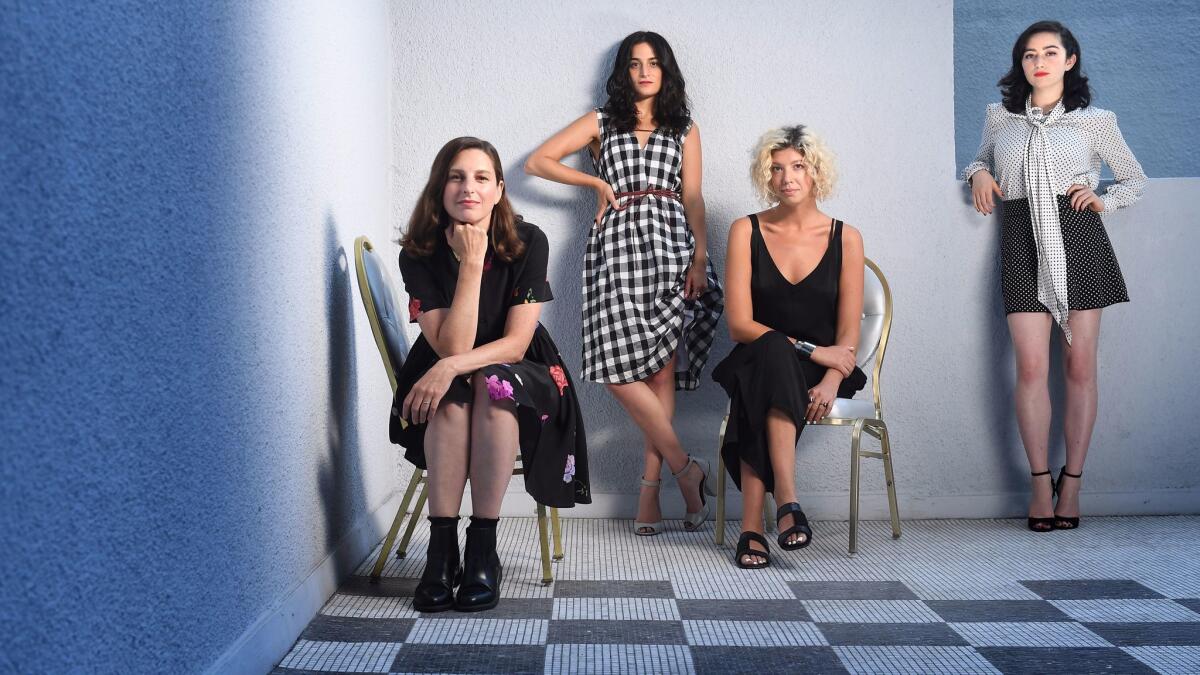Indie Focus: Family, friendship and a ‘futuristic whats-it’ with ‘Landline,’ ‘Girls Trip’ and ‘Valerian’
Hello! I’m Mark Olsen, and welcome to another edition of your regular field guide to a world of Only Good Movies.
The unexpected run of smart summer blockbusters continues apace with this week’s release of “Dunkirk,” written and directed by Christopher Nolan. Though it’s easy to forget now, Nolan began as a small-scale independent filmmaker with movies such as “Following” and “Memento,” and in many ways he has always continued to operate in that same way.
His new “Dunkirk,” an action-thriller epic set during the rescue of nearly 400,000 British and Allied soldiers from a French beach in the spring of 1940, would be ambitious at any time of year, but particularly during the summer.
As Nolan told The Times’ Josh Rottenberg, “It’s very exciting to be putting something different out to the audience, but it’s also very frightening… It feels like it raises the stakes for the success of the film. It feels like we’re carrying a bit more than we realized going into it in terms of what movies can work or can’t work in the summer.”
And we’ve had an exciting title slot in for an August screening and Q&A on short notice. To find out more and for updates on future events, go to events.latimes.com.

‘Landline’
The “Obvious Child” team of actress Jenny Slate, director and co-screenwriter Gillian Robespierre and producer and co-screenwiter Elisabeth Holm reunite for the new “Landline.” In the film, Slate plays a woman in crisis over how her life is turning out, so she seeks refuge with her parents (Edie Falco, John Turturro) and sister (sparkling newcomer Abby Quinn), which pushes the entire family to reevaluate where they’re at.
I spoke to Slate, Robespierre, Holm and Quinn about the film as a portrait of sisterly bonds and its relationship to the typical rom-com.
“It’s a romantic comedy sort of sans romance, but with love and intimacy and passion,” said Robespierre.
“I feel like we can tell a story that has romance while still questioning these pillars of what so often define a romantic comedy,” added Holm.
Though she liked the movie less than I did, in her review for The Times, Sheri Linden said, “A scene in which the sisters stake out their father’s office building has a bright, charged spontaneity, a nervous undertow and a dynamic sense of midweek Manhattan. It’s precisely the kind of comic-dramatic fusion that’s missing from most of the film — though there are glimmers of persuasive sisterly scrapping and bonding elsewhere, with newcomer Quinn delivering an impressively unruly combination of spirited and sullen.”
Noting the ’90s setting and the movie’s sisters, in his review for the New York Times, A.O. Scott wrote, “It’s strange to think that if Ali and Dana were real, they would now be in their early and later 40s. The fact that they seem so much like present-day young people is less an anachronism than an aspect of the film’s hopeful, soothing attitude. It’s a peace offering from Generation X to the millennials, a gesture of solidarity from one cohort of the metropolitan upper-middle class to another. We’re just like you, and we’ll all grow up eventually.”
At Time, Stephanie Zacharek compared the new film with “Obvious Child,” noting that “while this picture doesn’t have the same quiet-earthquake impact, it’s just as emotionally open and just as funny… And Slate, with her marvelous, helium-tinged voice, is a pure pleasure to watch. At one point she responds to a friend’s outrageous dating tale with a classic spit-take. Somehow she makes it both elegant and hilarious.”
‘Girls Trip’
A broad, upbeat comedy in a summer that has had far too few of them, “Girls Trip” features a superb ensemble in Jada Pinkett Smith, Regina Hall, Queen Latifah and Tiffany Haddish as, well, some women who take a trip. The story becomes more complicated from there. Directed By Malcolm D. Lee, the film has a screenplay by Kenya Barris and Tracy Oliver.
In his review for The Times, Justin Chang calls the film “sensationally assured and entertaining” while going on to say, “The mix of outrageous comedy and gentle sentimentality is familiar but very fresh, especially in the hands of four actresses who effortlessly establish a sense of shared history.”
Also for The Times, Tre’vell Anderson interviewed director Lee, who said, “This is fun, and this is black women telling their story the way they see themselves. Black girl magic is real, and everyone’s craving it right now.”
Anderson also surveyed black women in comedy and put together 18 mini-profiles, including one of Haddish
Reviewing the film for the New York Times, Manohla Dargis compared it to the recent “Rough Night” by saying, “The friends in ‘Girls Trip’ have other issues to work on, all of which are grounded in ordinary life: how to live in the world with love and joy, how to nurture intimate relationships so they don’t slip away, how to balance professional and personal obligations without going nuts, how to perform fairly tricky sexual acts without embarrassing you or your partner right out of bed — you know, the usual.”
At Vulture, Emily Yoshida added, “That’s a deceptively high bar of difficulty for a comedy of this scale to pull off, but ‘Girls Trip’ makes it look easy.”
‘Valerian and the City of a Thousand Planets’
French filmmaker Luc Besson makes audacious, extravagant movies that aren’t afraid to look a little ridiculous. He gets a kick out of this stuff, including previous sci-fi excursions “The Fifth Element” and “Lucy,” and his new “Valerian and City of a Thousand Planets” seems no different. Starring Dane DeHaan and Cara Delevingne (with a cameo by Rihanna!) the film is an eye-popping adaptation of a French comic book series set in the 28th century.
Reviewing the movie for The Times, Justin Chang called it “Besson’s latest futuristic whats-it” and went on to say, “When you enter the theater, you can pick up your 3-D glasses with one hand and drop off your brain with the other. All in all, you might not consider it the worst exchange. A passion project for Besson… this extravagant burst of feature-length silliness is the most expensive French production in film history.”
Speaking to The Times’ Josh Rottenberg, Besson addressed the challenges of making the big-budget project given audiences’ appetite these days: “It’s not safe. The audience would rather see ‘Blah-Blah-Man 12’ because at least they know where they’re going. You go to see ‘Valerian’ and it’s a little risky because it’s new. But that’s also how you get pleasure. It’s like food: If you always get the same thing at the restaurant, OK, it’s safe, but sometimes you have to say, ‘I’ve never tasted that — let’s try it.’ ”
At the New York Times, A.O. Scott begins his review by saying, “I feel I can say with certainty that 2017 will go down in film history as the Year of the Crazy Dane DeHaan Movie.” He concludes by saying the movie “feels as if it were made up on the spot, by someone so delighted by the gaudy genre packaging at his disposal that he lost track of what was supposed to be inside.”
Email me if you have questions, comments or suggestions, and follow me on Twitter@IndieFocus
SIGN UP for the free Indie Focus movies newsletter »
More to Read
Only good movies
Get the Indie Focus newsletter, Mark Olsen's weekly guide to the world of cinema.
You may occasionally receive promotional content from the Los Angeles Times.







